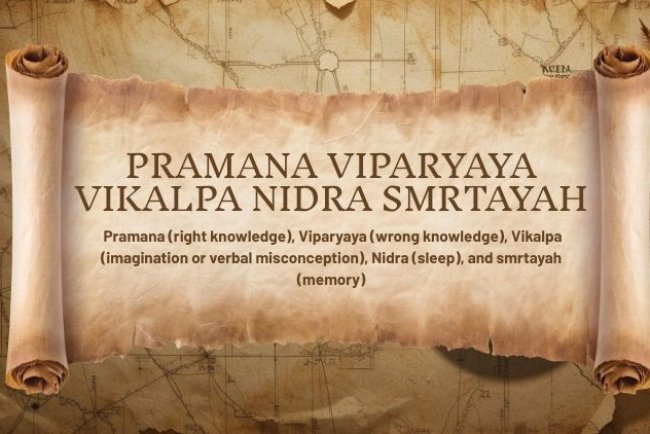Yoga Sutra 1.26: sa purvesam-api-guruh kalena anavacchedat

Translation: Isvara is the teacher of even the most ancient teachers, unbounded by time.
The Yoga Sutras of Patanjali are not merely philosophical reflections—they are a living guide to practice and realization. Each aphorism in the first chapter builds seamlessly upon the previous one, drawing us deeper into the essence of yoga as both a journey and a state of being.
In Sutra 1.23, Patanjali introduced Isvara-praṇidhāna—devotion to the Supreme Self—as a direct path to attaining samadhi (absorption).
In Sutra 1.24, he described Isvara as untouched by afflictions (klesa), actions (karma), their results (vipaka), and the latent impressions (asaya).
Then, in Sutra 1.25, he revealed Īśvara as the eternal seed of all knowledge.
Now, in Sutra 1.26, Patanjali elevates this understanding further—declaring Isvara to be the teacher of even the ancient teachers, one who transcends the bounds of time itself. This profound statement emphasizes the timeless and unchanging nature of divine consciousness. Isvara is not confined to history, lineage, or human intellect; rather, He is the eternal source from which all true wisdom flows.
Through this sutra, Patanjali reminds us that the highest guidance—the voice of the eternal teacher—resides beyond the limits of time and is ever available to the sincere seeker.
Yoga Sutra 1.26 — Text and Translation
Sanskrit:
स एष पूर्वेषामपि गुरुः कालेनानवच्छेदात्॥ २६॥
Transliteration:
Sa eṣa purvesam api guruh kalenanavacchedat
Translation:
“He (Isvara) is the guru of even the most ancient teachers, for He is beyond the limitations of time.”
Word-by-Word Breakdown
-
Sah (सः): He
-
Esah (एषः): This — referring to Isvara mentioned in the preceding sutras
-
Purvesam (पूर्वेषाम्): Of the ancients, those who lived before
-
Api (अपि): Even
-
Guruh (गुरुः): Teacher, guide, or source of wisdom
-
Kālena (कालेन): By time
-
Anavacchedāt (अनवच्छेदात्): Being beyond limitation, unaffected or unbounded
Interpretation:
In this sutra, Patanjali presents Isvara as the eternal teacher—one who transcends all boundaries of time and history. He is the guiding light behind every lineage, the timeless source from which true knowledge arises. All gurus, saints, and sages are but reflections of this one infinite consciousness that remains unaltered through the ages.
What Does Yoga Sutra 1.26 Teach Us?
In this sutra, Patanjali reveals Isvara as the teacher of teachers — the eternal Guru who guides all masters, past and present. Unlike human teachers, whose wisdom is shaped by time, experience, and circumstance, Isvara stands beyond all temporal boundaries. The Divine Consciousness is the timeless source of knowledge—ever-present, ever-accessible, and unconditioned by history or change.
This sutra beautifully acknowledges that while human teachers, scriptures, and traditions serve as essential guides, they ultimately lead us toward the same radiant source — the immortal wisdom of Isvara. Every authentic teaching, across cultures and centuries, reflects a spark of this eternal light.
In yogic philosophy, the word guru goes far deeper than its common understanding. Derived from gu (darkness) and ru (remover), a guru is one who dispels ignorance and reveals truth. While human gurus illuminate our path through instruction and example, Isvara is the universal Guru — not through words, but through pure presence and grace.
Patanjali reminds us here that Isvara is not bound by the cycles of birth and death, nor by the decay of time. He did not arise within history; rather, He transcends it entirely. Isvara is ubiquitous, beginningless, and endless—the prime teacher whose wisdom never ages.
In every era, yoga’s truths remain fresh, vital, and available to all who sincerely seek them. The eternal Guru continues to guide, not from the pages of time, but from the silence of the infinite within.
Īśvara’s Timelessness
The phrase “kalena anavacchedat” — meaning “not bound by time” — holds profound significance in this sutra. From the yogic perspective, time (kala) itself is a creation of prakrti (nature), ever in motion and constant transformation. Everything within time eventually changes, decays, and transforms.
But Isvara transcends prakrti and therefore stands beyond time’s reach. Unlike all temporal beings and phenomena, Īśvara is eternal, unchangeable, and ever-present.
For the practitioner, this truth is not merely philosophical—it is experiential. To connect with Isvara is to attune oneself to a field of consciousness untouched by change or decay. Through devotion, contemplation, and surrender, we access this timeless wisdom — a reservoir of truth as alive today as it was thousands of years ago.
Isvara as the Source of All Teachers
Across all traditions — from the Vedic seers to the yoga masters of today — authentic teaching arises from the same eternal source. The Upanishads remind us that divine knowledge is not invented; it is revealed to the rsis (sages) through grace and inner stillness. In the same way, Patanjali declares Isvara as the original Guru, the fountainhead from which all true wisdom flows.
Understanding this transforms the way we approach teaching and learning. It invites humility, reverence, and responsibility. While we deeply honor human teachers, we also recognize that they are channels of a higher truth, not owners of it. Their authority comes not from ego, but from their alignment and surrender to Isvara—the divine source of all knowledge and light.
Practical Application of Yoga Sutra 1.26
How can this ancient teaching guide our daily life and practice?
1. Cultivate Reverence
Begin your practice with humility and devotion, remembering that true wisdom is not bound by time. Even when learning from books or teachers, recognize that it is Isvara’s timeless presence that speaks through them. Let every act of learning become an offering to the eternal source of knowledge.
2. Trust Inner Guidance
Isvara, the eternal Guru, is ever guiding us. When the mind becomes quiet and the heart receptive, intuition and clarity naturally arise — the gentle voice of the inner guru, a reflection of Isvara’s wisdom within. Trust this inner knowing as a sacred compass on your path.
3. Rise Beyond Time Pressure
Modern life is ruled by the clock — we rush toward progress and fear falling behind. This sutra reminds us that spiritual growth unfolds beyond time. When we release the pressure to “achieve,” and simply rest in presence, the timeless nature of yoga begins to reveal itself.
4. Honor All Teachers
Since Isvara is the origin of all wisdom, to respect our teachers is to honor the divine source behind them. Every genuine guru is a reflection of that eternal light. Cultivate gratitude for all who have guided you, for through them, the voice of the eternal Guru continues to shine.
The Role of the Guru in Yoga
This sutra further refers to the importance of the guru principle in yoga. Not everyone may have a teacher in the personal sense, but all seekers are taught by the presence of Isvara throughout their lifetime, awareness, and inner realization.
As we surrender to this timeless teacher, the way is less about intellectual achievement and more about one's own transformation. The practice shifts from "practicing yoga" to allowing yoga to emerge within us.
How Sutra 1.26 Can Enrich Your Practice
This sutra offers timeless guidance that can deepen and transform your yoga journey. Here are four ways to bring its wisdom into your daily practice:
1. Begin with Reverence
Start your practice by acknowledging the eternal Guru, Isvara. A brief moment of mental namaste reminds you that your practice is not merely personal effort, but a connection to something vast, sacred, and timeless.
2. Tune into Inner Silence
After asana or pranayama, take a few moments to sit quietly and listen. Insight often arises in stillness. Trust the gentle voice of intuition — it is the reflection of the eternal Guru speaking from within.
3. Release Attachment to Progress
Since truth itself is timeless, there is no need to rush. Mastery in yoga is not measured by how quickly you perfect a posture, but by the quality of your presence and sincerity in each moment. Allow growth to unfold naturally, without comparison or haste.
4. Honor the Lineage
Whatever you practice — whether asana, mantra, or meditation — exists because it has been passed down through generations from the timeless teacher. Practicing with gratitude keeps you humble, grounded, and connected to the living stream of wisdom that flows through all true teachings.
Final Thoughts
Yoga Sutra 1.26 reminds us that true wisdom transcends the boundaries of time and human limitation. Isvara, the eternal Guru, exists beyond the reach of history — guiding seekers across all ages, paths, and traditions. When we attune ourselves to this timeless presence, we connect to an infinite source of wisdom that is ever-present, unwavering, and all-pervading.
In our personal practice, this sutra invites us to approach yoga with humility, reverence, and openness. It teaches that wherever we are on our journey — whether at the beginning or far along the path — the eternal teacher walks beside us, leading us gently toward light, peace, and ultimate liberation.
What's Your Reaction?




























